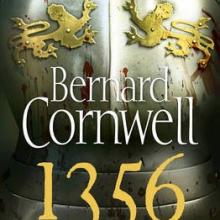
In it, Edward, Prince of Wales (the Black Prince), defeated the armies of France with its Scottish allies, in a hard-fought battle where his army including men from Gascony were outnumbered, thirsty, hungry and travel-worn. The King of France was taken back to London, to join King David of Scotland as a royal prisoner.
Cornwell guides us to Poitiers through the activities of Thomas of Hookton, known in France as le Bartard. Hookton, (who many readers will have met in Cornwell's Grail Series) is a descendant of one of the Dark Lords, who have hidden the sword of St Peter, believed to have mystical powers that both church and state would like to have on their side.
The challenging quest for this sword allows the treachery and brutality of both sides to be portrayed. Hookton leads a band of skilled and disciplined mercenary archers called the Hellequins. Their code of behaviour is strict and they have fierce loyalty to each other and to Hookton. This is the background to the tale.
Cornwell talks of ''the battle's dance''. He writes a virtual choreography for this dance. The reader is moved from grand overview to detail, from hidden to open presences, from action to complete inaction, from mob behaviour to individual reflection or action.
There is never a moment that is not totally focused and intentional. All this conspires to move your interest forward. His chapter pattern is interesting. For the most part a chapter will begin with a description of action, and then there will be spaces. Each space is invariably followed by a clear statement of what some character is feeling, doing, thinking.
''Roland de Verrac felt his soul soar like a bird in a clear sky''. Chapters frequently end with a terse statement that tempts you into the next.
''And just then the first arrow flew''.
This is a book that will make a good Christmas present for a family. I can imagine it going on holiday and giving pleasure to many members in a multi-generational family. Some sections, such as the description of how bows and arrows are crafted, could be read aloud to children. It is a worthy addition to Bernard Cornwell's impressive suite of historical military novels.
Willie Campbell is a Dunedin educator.











